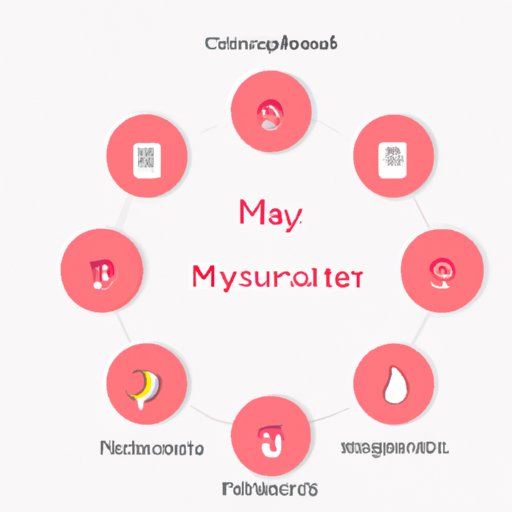
Introduction
Menstruation is a natural process that happens every month in women of reproductive age. While it is something that we all experience, many women are uncertain about the details of their menstrual cycle. Understanding your menstrual cycle can help you to predict when you will get your period, which can help you to plan and prepare. In this article, we explore how many days after ovulation you get your period and how to understand and track your menstrual cycle.
The Countdown Begins: Understanding the Length of Your Menstrual Cycle
The menstrual cycle refers to the hormonal changes that occur in a woman’s body over the course of approximately 28 days. The menstrual cycle begins on the first day of your period and ends on the first day of your next period. While the average length of a menstrual cycle is 28 days, many women have cycles that are shorter or longer than this.
Factors such as stress, changes in weight, and certain medical conditions can all affect the length of your menstrual cycle. If you are uncertain about the length of your menstrual cycle, you may wish to track it for several months to determine your average cycle length.
Fertility and Your Monthly Cycle: A Guide to Tracking Ovulation
Ovulation refers to the release of an egg from the ovary, which typically happens around day 14 of a 28-day menstrual cycle. Understanding when you ovulate is important if you are trying to conceive, as you are most likely to become pregnant if you have sex during the 24-48 hours surrounding ovulation.
There are a number of ways to track ovulation, including using ovulation predictor kits and charting your basal body temperature. Ovulation predictor kits work by detecting the surge in luteinizing hormone (LH) that occurs just before ovulation. Basal body temperature charting involves taking your temperature every morning and tracking changes in temperature over the course of your cycle.
Cracking the Code: How to Determine Your Period Start Date after Ovulation
The time between ovulation and the start of your next period is known as the luteal phase. The length of the luteal phase is typically between 10-16 days, with an average length of 14 days. If you know the length of your luteal phase, you can use it to determine when your next period will start.
To calculate the start date of your period after ovulation, subtract the length of your luteal phase from the date of ovulation. For example, if your luteal phase is 14 days and you ovulate on day 14 of your menstrual cycle, your next period will start on day 28 of your cycle.
The Waiting Game: A Look at Average Lengths between Ovulation and Menstruation
The average length of time between ovulation and menstruation is 14 days. However, this timeframe can vary from 10-16 days in length. If your cycle is consistently shorter or longer than this timeframe, it may be a sign of an underlying medical condition, such as polycystic ovary syndrome (PCOS) or thyroid dysfunction.
There are a number of factors that can delay menstruation after ovulation, including stress, changes in weight, and certain medications. If you experience delays in menstruation after ovulation, it is important to speak with your healthcare provider to determine the underlying cause.
Mastering the Menstrual Cycle: Tools to Predict Your Next Period after Ovulation
There are a variety of tools available to help you predict your next period after ovulation. Many women find that using a cycle tracking app can be helpful, as these apps allow you to input data about your cycle and predict when your next period will start. Other tools that can be useful include tracking cervical mucus changes and monitoring changes in the position of the cervix.
Conclusion
Understanding your menstrual cycle is an important part of managing your health and planning your life. By tracking your menstrual cycle and monitoring changes in your body, you can predict when your next period will arrive and take steps to manage any symptoms that you experience. If you are experiencing irregular cycles or fertility issues, it is important to speak with your healthcare provider to determine the underlying cause and develop a treatment plan that works for you.




